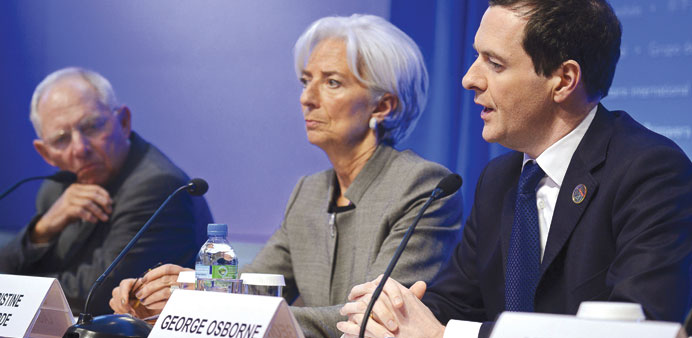Britain’s Chancellor of the Exchequer George Osborne (right) makes remarks as International Monetary Fund Managing Director Christine Lagarde (centre) and German Finance Minister Wolfgang Schaeuble look on at the IMF and World Bank’s 2015 Annual Spring Meetings in Washington.
Reuters/Washington
Britain favours the eventual inclusion of the Chinese yuan in the International Monetary Fund’s SDR basket of currencies, finance minister George Osborne said yesterday, saying it was important to include emerging powers in the world system.
He also sought to explain Britain’s surprise decision last month to join the Beijing-dominated Asian Infrastructure Investment Bank (AIIB), despite reservations from some allies, by reasoning that it was important to influence the bank’s direction.
The internationalisation of the yuan and the creation of the AIIB are part of China’s efforts to take a more dominant role in global finance, and advanced economies have not been in total agreement how to respond.
“I think our approach to China is one that reflects the very best of British values, which is we want to involve and include important emerging powers in the world system, and I don’t think it’s sensible to shut important economies...out from the institutions of the world,” Osborne told reporters.
He was speaking during meetings of the Group of 20 leading economies and of the International Monetary Fund, which will be considering this year whether to include the yuan, or renminbi, in its Special Drawing Rights (SDR) basket of currencies.
“That is something that’s under discussion now, and clearly at some point it will be sensible, as part of the internationalization of the renminbi, to see the renminbi come into the basket,” Osborne said.
“The UK has been at the forefront of trying to encourage the internationalisation of the renminbi, and London has become the preeminent western center for renminbi issuance,” he said. Britain was the first member of the Group of Seven leading industrialized countries to announce its intention to join the AIIB, about which the US and Japan have expressed reservations.
“We think it’s very important that we are there when important new multilateral bodies are created and that the UK is there helping to ensure that these new institutions operate on the principles of transparency and integrity, that we like to see in all international organizations,” Osborne said.
A British official, speaking on condition of anonymity, took issue with the idea that Britain had broken ranks with the G7, saying it had made clear its intentions to get in on the ground floor of the new multilateral bank.

